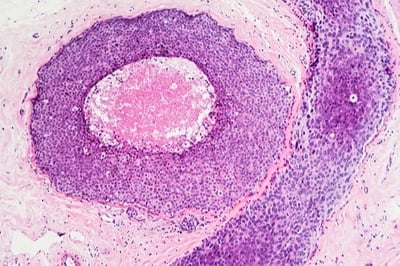FORCE's eXamining the Relevance of Articles for You (XRAY) program looks behind the headlines of cancer news to help you understand what the research means for you.
XRAY is a reliable source of hereditary cancer research-related news and information.
Learn more about the XRAY program
Keyword: medicine
Relevance: Medium-High


Strength of Science: Medium-High


Research Timeline: Human Research


Study : Dense breast notifications are informative but hard to read and understand
Relevance: Medium-High


Strength of Science: Medium-High


Research Timeline: Human Research


Most relevant for: Women with dense breast tissue on mammograms
Some states offer women dense breast notifications that are meant to explain that dense breasts are risk factors for breast cancer and can hide cancer on mammograms, and to identify appropriate supplemental screening options. But recent research found that this information is often not easy to read or understand, which questions the usefulness of the documents. (6/7/16)
Read More
Relevance: Medium


Strength of Science: Medium


Research Timeline: Human Research


Study : Cellular diversity in tumors may predict survival for some types of breast cancer
Relevance: Medium


Strength of Science: Medium


Research Timeline: Human Research


Most relevant for: People diagnosed with breast cancer that is "high-grade" or aggressive
Some tumors are made up of many different types of cells, while others contain generally the same cell type. This study found that among people with high-grade breast cancer, those who have tumors made up of many different cell types have a lower 10-year survival rate than people with tumors containing only a single type of cells. This research is an early step towards developing a new test that can help physicians identify cancers that need more aggressive treatment, but more research is needed before it is ready for clinical use. (4/26/16)
Read More
Relevance: Medium


Strength of Science: Medium-High


Research Timeline: Post Approval


Study : What are the genetics underlying 12 different cancer types?
Relevance: Medium


Strength of Science: Medium-High


Research Timeline: Post Approval


Most relevant for: People diagnosed with cancer
As gene sequencing has become more affordable, researchers and health care providers are now looking for mutations in many genes beyond BRCA1, BRCA2 and others that are associated with known hereditary cancer syndromes. By sequencing thousands of genes rather than just one or two, researchers can better understand which inherited mutations affect cancer risk. In this study, researchers sequenced thousands of genes in patients with one of 12 cancers, including breast, and catalogued which gene mutations are most commonly found in each cancer. (03/01/16)
Read More
Relevance: Medium


Strength of Science: Medium-High


Research Timeline: Human Research


Study : How many children with cancer have mutations in genes that increase cancer risk?
Relevance: Medium


Strength of Science: Medium-High


Research Timeline: Human Research


Most relevant for: Survivors of childhood cancer and people with a family history of relatives diagnosed with childhood cancers
Many genes are associated with increased cancer risk in adults, but it is unclear how common these mutations are in children with cancer. This study found that about 9% of children with cancer carry mutations in a gene that is known to increase cancer risk. Over half of the mutations were in the TP53 gene, which is associated with increased cancer risk at a young age and increased risk of breast cancer in adults. (12/15/2015)
Read More
Study : Effects of cancer diagnosis and treatment during pregnancy on the health and development of the child
Most relevant for: Women who were diagnosed with breast cancer while pregnant
Very little work has studied how a woman's cancer diagnosis and treatment during pregnancy affects her child. This study of women who were diagnosed with cancer while pregnant looks at their children at ages 18 months and 3 years. The study found no difference in general, cognitive, and cardiac development when compared to children born to healthy mothers. (12/08/2015)
Read More
Relevance: Medium


Strength of Science: Medium-Low


Research Timeline: Human Research


Study : Breastfeeding may reduce hormone receptor negative breast cancer risk
Relevance: Medium


Strength of Science: Medium-Low


Research Timeline: Human Research


Most relevant for: Women who are pregnant or have just given birth and are deciding about breastfeeding
Previous studies have shown that women who breastfeed have a reduced breast cancer risk. This study examines this association in the different breast cancer subtypes (ER, PR, HER2 negative/positive) and finds that breastfeeding is associated with a reduced risk of ER-/PR- breast cancer. (11/16/2015)
Read More
Relevance: Medium


Strength of Science: Medium


Research Timeline: Human Research


Study : New research may lead to a blood test that detects breast cancer recurrence earlier
Relevance: Medium


Strength of Science: Medium


Research Timeline: Human Research


Most relevant for: People diagnosed with early stage breast cancer
Recent headlines announced a blood test that can potentially predict which breast cancer survivors are at risk of recurrence. This particular blood test, one of many being developed, is sometimes called a “liquid biopsy.” This early research focuses on a technique that is promising, but not yet available to breast cancer survivors. (10/12/15)
Note: THIS INFORMATION HAS BEEN UPDATED on 11/07/19 with newly-published data. See our updated article: A new blood test may help predict early-stage breast cancer patients at highest risk for recurrence.
Read More
